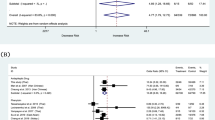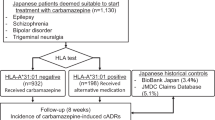Abstract
To study the possible genetic associations with adverse drug reactions (ADR), the Singapore Health Sciences Authority (HSA) has piloted a program to collect DNA and phenotype data of ADR cases as part of its pharmacovigilance program. Between 2009 and 2012, HSA screened 158 cases of Stevens–Johnson syndrome (SJS) and toxic epidermal necrolysis (TEN). To assess the association between HLA-B*1502 and carbamazepine (CBZ)-induced SJS/TEN, 13 cases and 26 drug-tolerant controls were analyzed. All 13 CBZ-SJS/TEN cases and 3/26 controls were HLA-B*1502 positive (odds ratio 181, 95% confidence interval: 8.7–3785, P=6.9 × 10−8). Discussions of the finding with the Ministry of Health and an expert panel led to the decision to make HLA-B*1502 testing the standard of care prior to first use of CBZ in Asians and to subsidize the genotyping test at public hospitals. This program illustrates the role of a regulatory authority in advancing the use of pharmacogenetics for drug safety.
This is a preview of subscription content, access via your institution
Access options
Subscribe to this journal
Receive 6 print issues and online access
$259.00 per year
only $43.17 per issue
Buy this article
- Purchase on Springer Link
- Instant access to full article PDF
Prices may be subject to local taxes which are calculated during checkout


Similar content being viewed by others
References
Aagaard L, Strandell J, Melskens L, Petersen PSG, Holme Hansen E . Global patterns of adverse drug reactions over a decade: analyses of spontaneous reports to VigiBase™. Drug Saf 2012; 35: 1171–1182.
Chung W-H, Hung S-I, Hong H-S, Hsih M-S, Yang L-C, Ho H-C et al. A marker for Stevens-Johnson syndrome. Nature 2004; 428: 486.
Lonjou C, Thomas L, Borot N, Ledger N, De Toma C, Lelouet H et al. A marker for Stevens-Johnson syndrome ethnicity matters. Pharmacogenomics J 2006; 6: 265–268.
Man CBL, Kwan P, Baum L, Yu E, Lau KM, Cheng ASH et al. Association between HLA-B*1502 allele and antiepileptic drug-induced cutaneous reactions in Han Chinese. Epilepsia 2007; 48: 1015–1018.
Locharernkul C, Loplumlert J, Limotai C, Korkij W, Desudchit T, Tongkobpetch S et al. Carbamazepine and phenytoin induced Stevens-Johnson syndrome is associated with HLA-B*1502 allele in Thai population. Epilepsia 2008; 49: 2087–2091.
Ueta M, Sotozono C, Tokunaga K, Yabe T, Kinoshita S . Strong association between HLA-A*0206 and Stevens-Johnson syndrome in the Japanese. Am J Ophthalmol 2007; 143: 367–368.
Pirmohamed M, Friedmann PS, Molokhia M, Loke YK, Smith C, Phillips E et al. Phenotype standardization for immune-mediated drug-induced skin injury. Clin Pharmacol Ther 2011; 89: 896–901.
Hung S-I, Chung W-H, Jee S-H, Chen W-C, Chang Y-T, Lee W-R et al. Genetic susceptibility to carbamazepine-induced cutaneous adverse drug reactions. Pharmacogenet Genomics 2006; 16: 297–306.
Pozzi S, Longo A, Ferrara GB . HLA-B locus sequence-based typing. Tissue Antigens 1999; 53: 275–281.
Petersdorf EW, Longton GM, Anasetti C, Martin PJ, Mickelson EM, Smith AG et al. The significance of HLA-DRB1 matching on clinical outcome after HLA-A, B, DR identical unrelated donor marrow transplantation. Blood 1995; 86: 1606–1613.
van der Zwan AW, Griffith B, Rozemuller E In: Tilanus MG, Hansen JA, Hurley C, (eds). IHWG Technical Manual Genomic Analysis of the Human MHC DNA-Based Typing for HLA Alleles and Linked Polymorphism. International Histocompatibility Working Group: Seattle, 2000, pp TMI14.A12–14.
McCormack M, Alfirevic A, Bourgeois S, Farrell JJ, Kasperavičiūtė D, Carrington M et al. HLA-A*3101 and carbamazepine-induced hypersensitivity reactions in Europeans. N Engl J Med 2011; 364: 1134–1143.
Ozeki T, Mushiroda T, Yowang A, Takahashi A, Kubo M, Shirakata Y et al. Genome-wide association study identifies HLA-A*3101 allele as a genetic risk factor for carbamazepine-induced cutaneous adverse drug reactions in Japanese population. Hum Mol Genet 2011; 20: 1034–1041.
Lam TH, Shen MX, Chia JM, Chan SH, Ren EC . Population-specific recombination sites within the human MHC region. Heredity 2013; 111: 131–138.
Lazarou J, Pomeranz BH, Corey PN . Incidence of adverse drug reactions in hospitalized patients: a meta-analysis of prospective studies. JAMA 1998; 279: 1200–1205.
Pirmohamed M, James S, Meakin S, Green C, Scott AK, Walley TJ et al. Adverse drug reactions as cause of admission to hospital: prospective analysis of 18 820 patients. BMJ 2004; 329: 15–19.
Davies EC, Green CF, Taylor S, Williamson PR, Mottram DR, Pirmohamed M . Adverse drug reactions in hospital in-patients: a prospective analysis of 3695 patient-episodes. PLoS One 2009; 4: e4439.
Dave DM, Goyal RK, Joshi CG, Mehta TY, Mittal B, Patel DB . Association of HLA-B*1502 allele and carbamazepine-induced Stevens-Johnson syndrome among Indians. Indian J Dermatol Venereol Leprol 2009; 75: 579–582.
Then SM, Rani Z, Raymond A, Ratnaningrum S, Jamal R . Frequency of the HLA-B*1502 allele contributing to carbamazepine-induced hypersensitivity reactions in a cohort of Malaysian epilepsy patients. Asia Pac J Allergy Immunol 2011; 29: 290–293.
Yip VL, Marson AG, Jorgensen AL, Pirmohamed M, Alfirevic A. HLA . Genotype and carbamazepine-induced cutaneous adverse drug reactions: a systematic review. Clin Pharmacol Ther 2012; 92: 757–765.
Ko T-M, Chung W-H, Wei C-Y, Shih H-Y, Chen J-K, Lin C-H et al. Shared and restricted T-cell receptor use is crucial for carbamazepine-induced Stevens-Johnson syndrome. J Allergy Clin Immunol 2011; 128: 1266–1276.
Dong D, Sung C, Finkelstein EA . Cost-effectiveness of HLA-B*1502 genotyping in adult patients with newly diagnosed epilepsy in Singapore. Neurology 2012; 79: 1259–1267.
Theodore WH, Spencer SS, Wiebe S, Langfitt JT, Ali A, Shafer PO et al. Epilepsy in North America: a report prepared under the auspices of the global campaign against epilepsy, the International Bureau for Epilepsy, the International League Against Epilepsy, and the World Health Organization. Epilepsia 2006; 47: 1700–1722.
Carleton B, Poole R, Smith M, Leeder J, Ghannadan R, Ross C et al. Adverse drug reaction active surveillance: developing a national network in Canada’s children’s hospitals. Pharmacoepidemol Drug Saf 2009; 18: 713–721.
Molokhia M, McKeigue P . EUDRAGENE: European collaboration to establish a case-control DNA collection for studying the genetic basis of adverse drug reactions. Pharmacogenomics 2006; 7: 633–638.
Holden AL . The innovative use of a large-scale industry biomedical consortia to research the genetic basis of drug induced serious adverse events. Drug Discov Today 2007; 4: 75–85.
Pirmohamed M . Pharmacogenetics: past, present and future. Drug Discov Today 2011; 16: 852–861.
Kaniwa N, Saito Y, Aihara M, Matsunaga K, Tohkin M, Kurose K et al. HLA-B locus in Japanese patients with anti-epileptics and allopurinol-related Stevens-Johnson syndrome and toxic epidermal necrolysis. Pharmacogenomics 2008; 9: 1617–1622.
Acknowledgements
We thank the clinical research coordinators (NUH: Ms Seow Lih Jen, Ms Serene Ng and Mr Eric Seow; SGH: Ms Goh Poh Kuan and Ms Ei Mon Soe; CGH: Ms Low Li Fang, Ms Geraldine Lim and Ms Candy Yang) for assistance in patient recruitment and data collection, Dr Mariam Molokhia for sharing the RegiSCAR protocol, Lee Yan Lim and Tzer Jing Seng for assistance with developing the e-CRF and coding protocols, Singapore Tissue Network/Singapore Biobank and National University Health Systems Tissue Repository for sample storage and processing services, and the HSA Pharmacogenetics Expert Panel for valuable suggestions on design and implementation of the study. This study was funded by HSA.
Author contributions
Conceived the project: DT, LLT, CLL and CS; study design and site set up: DT, LLT, DCWA, SMP, TT, HYL, YKT, CL and CS; managed the project and monitored cases: LLT and CL; screened, recruited and consented patients: DCWA, SMP, SHL, HYL, YYT, SKT, AV, AL and YYC; genotyping and data analysis: ECR, ESCK, LLT and CS; wrote the manuscript: CS and DT.
Author information
Authors and Affiliations
Corresponding author
Ethics declarations
Competing interests
The authors declare no conflict of interest.
PowerPoint slides
Rights and permissions
About this article
Cite this article
Toh, D., Tan, L., Aw, D. et al. Building pharmacogenetics into a pharmacovigilance program in Singapore: using serious skin rash as a pilot study. Pharmacogenomics J 14, 316–321 (2014). https://doi.org/10.1038/tpj.2013.46
Received:
Revised:
Accepted:
Published:
Issue Date:
DOI: https://doi.org/10.1038/tpj.2013.46
Keywords
This article is cited by
-
Ethnicity-Specific Drug Safety Data in European Medicines Agency Registration Dossiers, European Public Assessment Reports, and European and Singapore Drug Labels: Lost in Translation?
Pharmaceutical Medicine (2019)
-
Applications of pharmacogenomics in regulatory science: a product life cycle review
The Pharmacogenomics Journal (2018)
-
Increased risk of strontium ranelate-related SJS/TEN is associated with HLA
Osteoporosis International (2016)
-
Pharmacogenomics in the clinic
Nature (2015)



